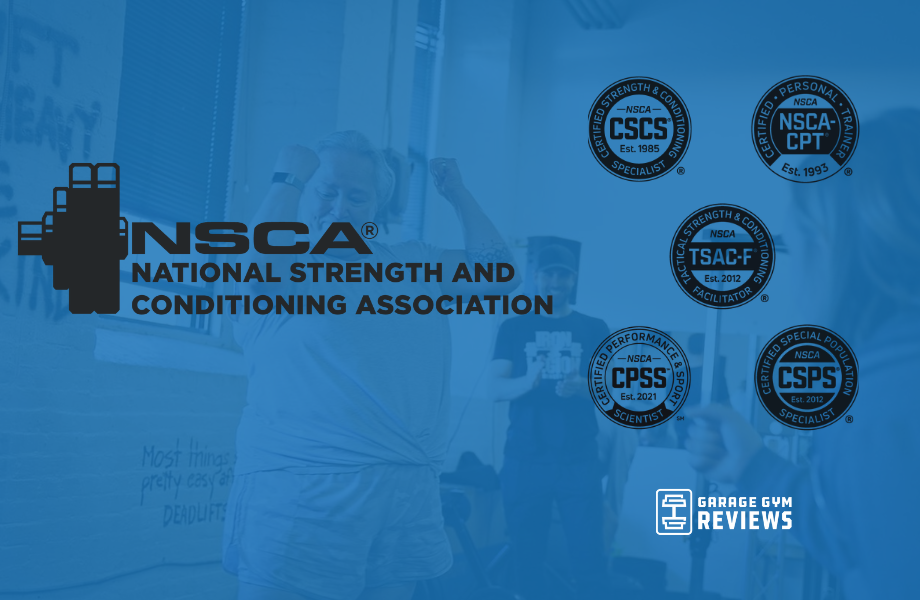We test and review fitness products based on an independent, multi-point methodology. If you use our links to purchase something, we may earn a commission. Read our disclosures.
One of the first steps to fulfilling your dream of becoming a personal trainer is selecting an institution where you’re going to get certified or obtain advanced certifications. Alongside hands-on experience with clients, passing a certification exam and having personal training credentials can help increase your chances of landing a job and adding clients to your roster.
The National Strength and Conditioning Association (NSCA) is one of many organizations to choose from to earn industry knowledge and the credentials to back it up. The NSCA certification courses include personal training, specialization populations, and advanced certifications.
The NSCA also offers opportunities to grow your career and knowledge as a coach. And I should know—I’m an active member of the NSCA and a NSCA-certified personal trainer (CPT).
For this NSCA certification review, I enlisted Jarrod Nobbe, CSCS, USAW-L2, and Garage Gym Reviews expert panelist, to talk about his experience with the NSCA certification program. Additionally, I chatted with Liz Myers, CSCS and owner of Mountain Edge Performance, about how she uses her certification.
In addition to my experience with the NSCA (and picking the brains of Liz and Jarrod about their experience) I also used our Garage Gym Reviews testing methodology to review and rate the following categories on a 1-to-5-star scale:
- Course and exam price
- Course length
- Accreditation
- Prerequisites
- Continuing education requirements
- Study materials and learning options
- Final exam
At the end of this review, I will dive into more detail about these categories, and what the NSCA offers and what to expect for prices, materials, and final exams.
5 NSCA Certification Options:
- Certified Strength and Conditioning Specialist: NSCA CSCS
- Certified Personal Trainer: NSCA-CPT
- Certified Performance And Sport Scientist: NSCA CPSS
- Certified Special Population Specialist: NSCA CSPS
- Tactical Strength And Conditioning Facilitator: NSCA TSAC-F
What Does a NSCA Certification Do?
Having a NSCA certification provides a solid base for your career as a personal trainer or strength and conditioning coach. While each exam and certification from the NSCA has a different focus, all exams cover some degree of anatomy, physiology, exercise technique, exercise selection, program design, and nutrition.
The NSCA is one of the most recognized educational institutions for strength and conditioning professionals. It’s internally recognized in more than 70 countries and has 60,000 members worldwide.
The NSCA distinguishes itself from other certification programs by being the leader in research and development within the fitness industry. NSCA members can access the peer-reviewed research, practical application journals, and educational videos published by the NSCA for continuing education and to stay on the cutting edge of new research in the field.
A personal trainer certification or CSCS certification through the NSCA can help set you apart from other applicants. In this review, I’ll cover all five certifications offered by the NSCA.
Certified Strength and Conditioning Specialist: NSCA CSCS
Good for: Coaching collegiate-level or professional sports teams and individual athletes
CSCS
NSCA CSCS Certification
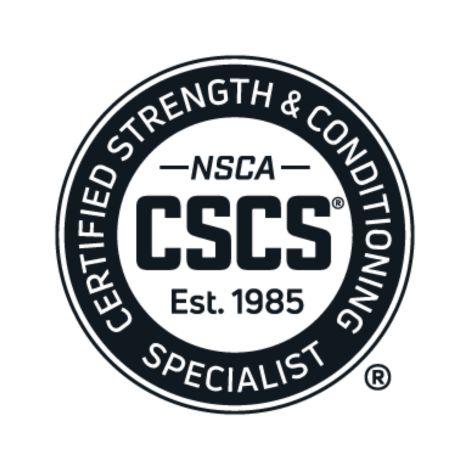
Product Highlights
- Certified Strength and Conditioning Specialist
- Prepares coaches to work with athletes and teams
- Bachelor’s degree required
- CPR/AED certification required
- 220-question exam
- 38% overall pass rate
Pros & Cons
Pros
- Highly recognized certification
- Delivers in-depth knowledge of strength and conditioning
- Multiple-choice question exam
Cons
- Study materials are separate from exam costs
- Exam must be taken within 120 days of registering
- In-person exam only
- Exam pricing starts at $340
Bottom Line
The CSCS program has been the gold-standard in the strength and conditioning community since 1985. The certification qualifies candidates to work with athletes, teams, and other sport-specific scenarios. To sit for the CSCS exam, you must have a bachelor’s degree or higher (or currently be enrolled as a college senior at an accredited institution). The CSCS is certified by the National Strength and Conditioning Association (NSCA).
If you plan and prepare for the CSCS exam, a passing score will earn you the title of Certified Strength and Conditioning Specialist. It’s the gold standard credential for strength and conditioning coaches who plan to work with collegiate and professional team sports or individual athletes.
Speaking of individual athletes—that’s exactly what Liz Myers, CSCS, does as owner of Mountain Edge Performance, a coaching business dedicated to strength and conditioning for ski and snowboard athletes. She also happens to be my pre-season ski coach, too! Her knowledge of mountain sports, paired with a deep understanding of strength adaptations, exercise selection, and sport psychology, has totally changed my perspective on training for a sport I adore.
That type of knowledge I’m benefiting from a coach like Liz stems from the CSCS study materials and exams are designed for coaches to understand how to improve an athlete’s overall athletic performance.
It’s an advanced certification that requires a bachelor’s degree and a current CPR/AED certification. When it comes to the quality of study materials and textbooks, the CSCS earns a 5-out-of-5-star rating.
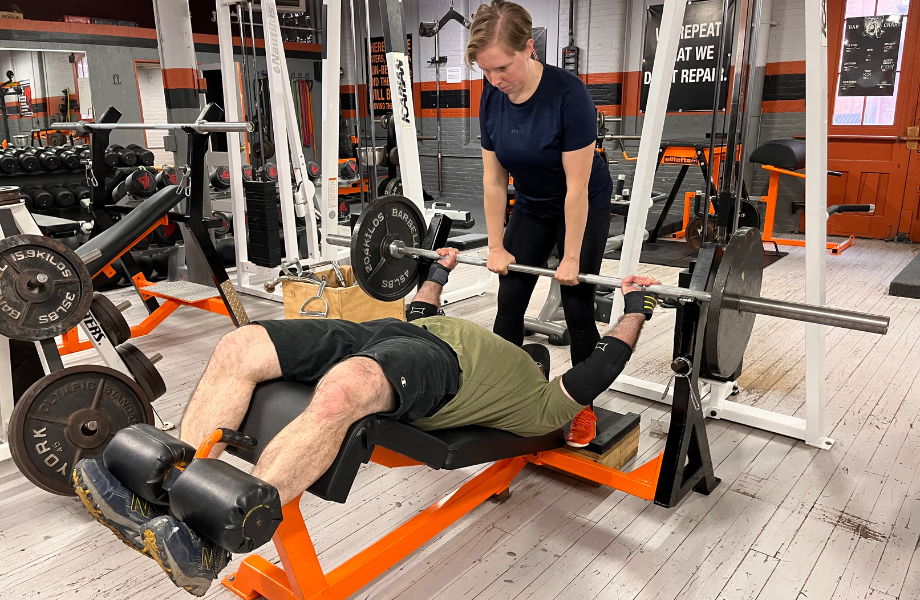
That said, it’s worth noting that currently the NSCA does not require a Bachelor of Science but that prerequisite is set to change on January 1, 2030. Starting in 2030, you will only be able to complete exam registration for the CSCS if you have a BS in kinesiology, exercise science, sport science, or a related field. This may also affect the scope of the exam.
Honestly, I’m not terribly surprised by the NSCA planning to change the prerequisites in the near future. The exam is quite difficult, and if you don’t have a deep understanding for topics like biomechanics, anatomy, and physiology, it can be quite difficult to prepare and comprehend the topics and relate it to the health and safety of athletes.
I also spoke to Jarrod Nobbe, CSCS, USAW-L2, about his experience and how the CSCS credentials open doors for his coaching career. Jarrod notes, “If you want to go into collegiate strength and conditioning, having your CSCS is definitely one of those first boxes hiring teams look to check off.”
RELATED: What is the CSCS?
| Textbooks | Essentials Of Strength Training And Conditioning; Exercise Technique Manual |
| Textbook prices | $107 ($109 for non-members); $80/$89 |
| Exam registration fee | $340 ($475 for non-members) |
| Course and textbook bundle | $265 ($269 for non-members) |
| Practice test/quizzes prices | $150 ($200 for non-members) |
| Study guide prices | $20 ($27 for non-members) |
| Exam format | 220 multiple-choice questions; in-person proctored exam; 4 hour max (broken into 2 sections) |
Certified Personal Trainer: NSCA-CPT
Good for: Anyone looking for a highly recognized organization to earn a CPT
CPT
NSCA-CPT Certification
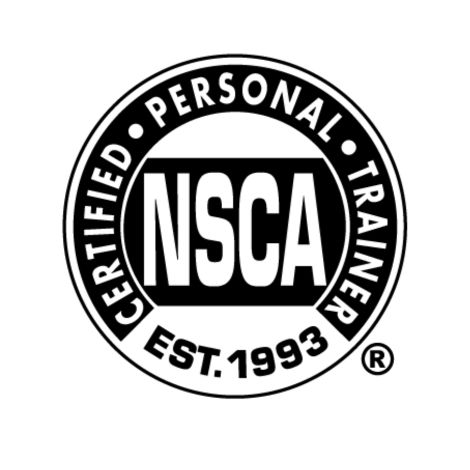
Product Highlights
- Certified personal trainer exam
- NCCA-accredited program
- 155-question exam
- Study materials sold separately
Pros & Cons
Pros
- NCCA-accredited program
- Provides accurate scope of practice
- In-depth approach to 1:1 coaching
- Multiple-choice question exam
Cons
- Study materials are separate from exam fees
- Exam fees are higher for non-NSCA members
- In-person exam only
Bottom Line
The certified personal trainer program from the National Strength and Conditioning Association (NSCA-CPT) offers an in-depth approach to coaching clients for safe and effective fitness programs. You’ll need to be CPR/AED certified to sit for the exam, be 18 years of age or older, and have a high school diploma. The NSCA-CPT exam is taken in-person at a proctored Pearson VUE testing center.
If you’re wondering how to become a personal trainer without spending thousands of dollars, the NSCA-CPT exam and study materials is an option I highly recommend.
I’m a certified personal trainer with the NSCA, and I thoroughly enjoy the a la carte buying options versus a course bundle like many other CPT certs offer (like NASM, ISSA, and NSCF). Because you’ll be able to buy each item for exam preparation separately and register for the exam when you’re ready, I give the NSCA-CPT a 5-out-of-5-star rating for overall value.
Unlike the CSCS, the NSCA-CPT does not require a bachelor’s degree. Exam eligibility requires candidates to be at least 18 years of age, have a high school diploma (or equivalent), and be CPR/AED certified (or plan to be within one year of the exam).
The CPT exam doesn’t require an advanced degree because it’s an entry-level credential that prepares you to work with general population clients. The CPT exam materials help you prepare for client consultations, appropriate program planning, exercise selection, and injury prevention.
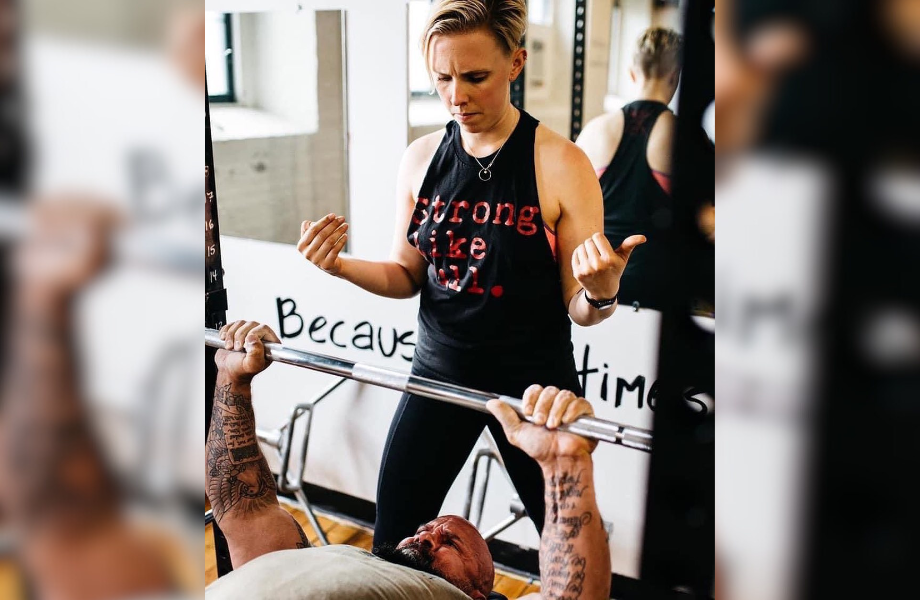
That said, the NSCA-CPT exam is not for the faint of heart. In 2022, there was a 66% pass rate for first-time exam takers. Although it covers categories essential for personal training—like client consultation, program planning, exercise technique, and safety protocols—exam questions go beyond basic anatomy and physiology. You’ll also need to recall several formulas, like how to calculate a one rep max, target heart rate, and blood pressure.
The exam also covers general nutrition supplements, nutrient timing, hydration, and daily caloric needs—covered in the Essentials of Personal Training textbook and exam preparation materials. In addition to the basics, I recall calculating a client’s calorie intake based on macronutrients provided in the test question.
RELATED: What is the ACE Certification?
| Textbooks | Essentials of Personal Training; Exercise Technique Manual |
| Textbook prices | $109 ($119 for non-members); $80/$89 |
| Exam registration fee | $300 ($435 for non-members) |
| Course and textbook bundle | $265 ($269 for non-members) |
| Practice test/quizzes prices | $150 ($200 for non-members) |
| Study guide prices | $20 ($27 for non-members) |
| Exam format | 155 multiple choice-questions; in-person proctored exam; 3 hour max |
Certified Performance And Sport Scientist: NSCA CPSS
Good for: Coaches looking for credentials to back up a passion for working with special populations
CPSS
NSCA CPSS
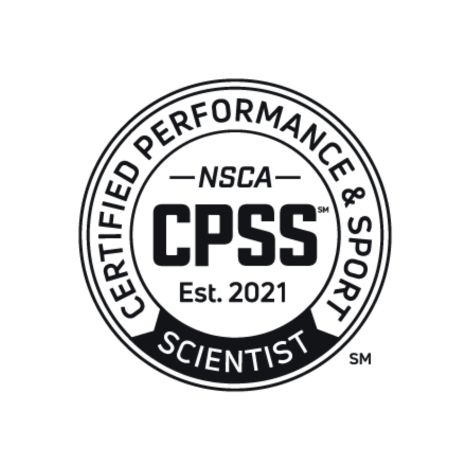
Product Highlights
- Certified Performance and Sport Scientist (CPSS)
- Advanced certification through NSCA
- Requires a Bachelor’s of Science degree or higher
- Specific applied experiences required
Pros & Cons
Pros
- Highly accredited program
- May help advance career
- NSCA's most advanced certification
Cons
- Study materials are separate from exam fees
- Exam fees are higher for non-NSCA members
- In-person exam only
Bottom Line
The Certified Performance and Sport Scientist (CPSS) program through the National Strength and Conditioning Association is the NSCA’s most advanced certification. The CPSS specializes in the application of scientific processes to improve individual and team athletic performance and decrease injury risk. To sit for the exam requires a Bachelor's of Science degree (and related professional experience) or higher.
The CPSS is the newest certification for the NSCA, launching in 2021. The CPSS stands for Certified Performance and Sport Scientist, which is the most advanced certification offered by the NSCA and requires a Bachelor of Science (or higher) in exercise science, kinesiology or related field.
Candidates who complete the CPSS NSCA certification exam and earn the Certified Performance and Sport Scientist credential will apply the scientific processes to improve individual and team athletic performance and decrease injury risk.
RELATED: Best Muscle Recovery Tools
According to the NSCA, CPSS-certified individuals work across multiple sport-related scientific disciplines to monitor and improve performance—collecting and analyzing data to make informed training recommendations.
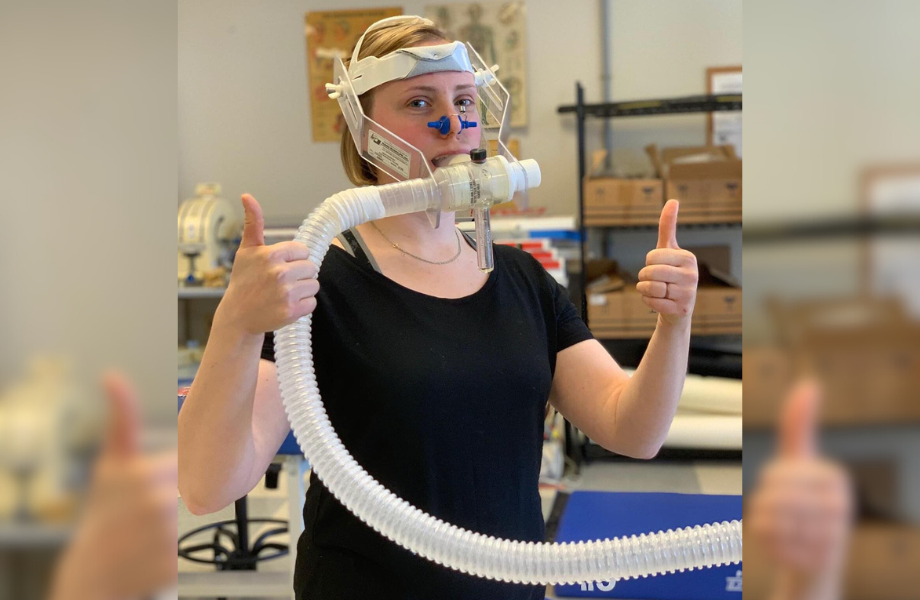
Folks holding the CPSS certification can be a good match for professional and collegiate-level athletic teams as well as high-level individual athletes.
The CPSS doesn’t offer an online study course, practice tests, or study guides, which may make the preparation process difficult (even for students with tons of related experience). Additionally, the website notes that the Essentials of Sport Science is the main textbook for this exam, but also lists five other textbooks as additional resources to consider:
- Periodization and Programming for Team Sports
- Biomechanics of Sport and Exercise, 4th Edition
Research Methods in Physical Activity, 7th Edition - Performance Assessment in Strength and Conditioning
- Statistics in Kinesiology, 5th Edition
Because the exam preparation path is not clearly defined by the NSCA, the CPSS certification earns a 3.5-out-of-5-star rating in the study materials and learning options category.
| Textbooks | Essentials of Sport Science |
| Textbook prices | $95 ($99 for non-members) |
| Exam registration fee | $25 application fee; $340 exam ($475 for non-members) |
| Course and textbook bundle | N/A |
| Practice test/quizzes prices | N/A |
| Study guide prices | N/A |
| Exam format | 115 multiple-choice questions; in-person proctored exam; 2 hours 45 minute max (broken into 2 sections) |
Certified Special Population Specialist: NSCA CSPS
Good for: Folks who have BS (or higher) in a field related to strength and conditioning
CSPS
NSCA CSPS
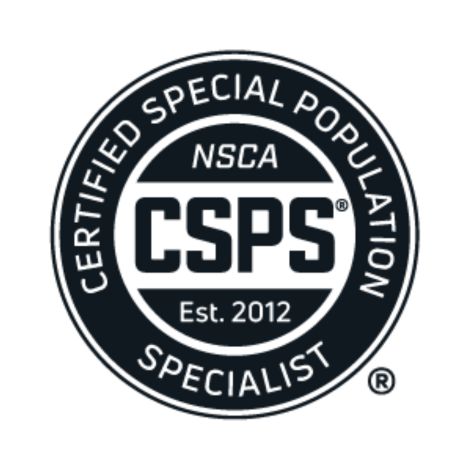
Product Highlights
- Certified Special Population Specialist (CSPS)
- Designed for trainers who work with special populations
- Bachelor’s degree required (or current NSCA certification)
- CPR/AED certification required
Pros & Cons
Pros
- Experience with special population clients required to sit for exam
- In-depth approach to special populations
Cons
- Study materials are separate from exam fees
- Exam fees are higher for non-NSCA members
- In-person exam only
Bottom Line
Certified Special Population Specialist (CSPS) program through the National Strength and Conditioning Association is for fitness professionals who aim to work with special populations. That may mean cancer, cardiovascular disorders, immune diseases, musculoskeletal or neuromuscular issues, or psychological issues.
The Certified Special Population Specialist (aka CSPS) exam helps prepare coaches, athletic trainers, or physical therapists to work with folks managing certain diseases and disorders, such as older adults, children, post-rehabilitation, cancer patients, or those with musculoskeletal or neuromuscular disorders, to name a few.
RELATED: Best Diabetic Meal Delivery
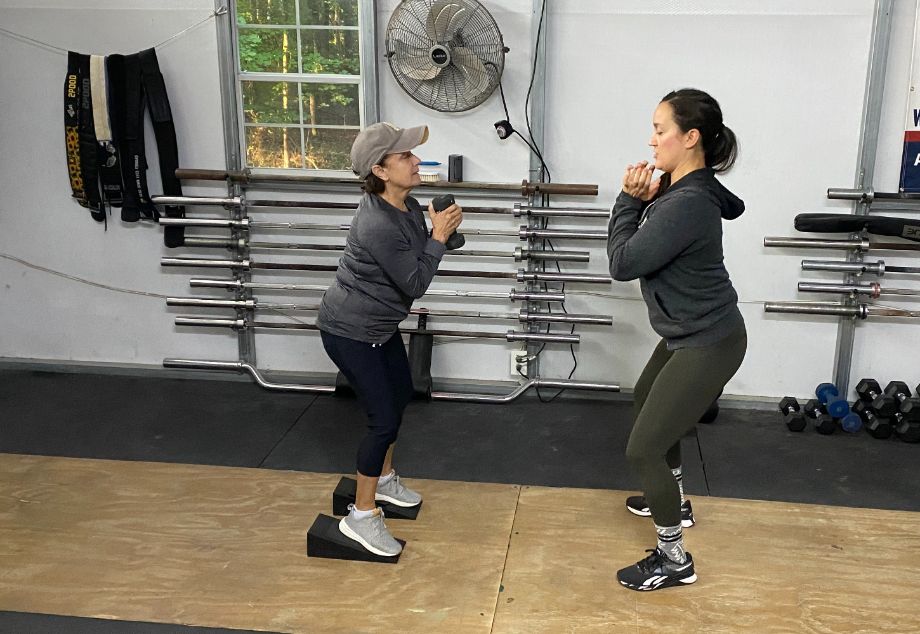
The CSPS is a credential that expands who you can coach and program for while still providing progressions rooted in strength and conditioning principles.
The bulk of the 110-question exam focuses on basic pathophysiology in addition to the science of health status and condition, disorder, or disease.
To sit for this exam, you’ll need 250 hours of experience training individuals from special populations, a current CPR/AED certification, and at least one of the following:
- NCCA-accredited personal trainer certification
- Current NSCA certification (CSCS, NSCA-CPT, TSAC-F)
- Current license as physical therapist, physical therapist assistant, athletic trainer, or registered dietitian
- Bachelor’s degree (or higher) from an accredited institution in exercise science or a related field
Because the CSPS doesn’t offer an online study course, the exam preparation category earns a 4-out-of-5-star rating. However, the overall NSCA value is still there because you can buy everything separately and on your own schedule. I also think there is value in this certification for current holders of the NSCA-CPT or CSCS because you can use the CSPS as a CEU opportunity (continuing education).
| Textbooks | Essentials of Training Special Populations |
| Textbook prices | $95 ($99 for non-members) |
| Exam registration fee | $340 ($475 for non-members) |
| Course and textbook bundle | N/A |
| Practice test/quizzes prices | $40 ($50 for non-members |
| Study guide prices | $20 ($27 for non-members) |
| Exam format | 110 multiple-choice questions; 2.5 hour max |
Tactical Strength And Conditioning Facilitator: NSCA TASC-F
Good for: folks aiming to work with emergency personnel for work-specific training
TASC-F
NSCA TASC-F
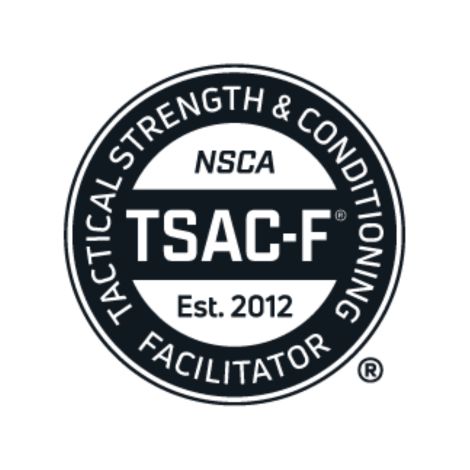
Product Highlights
- Certification for tactical facilitators
- Designed for military, fire and rescue, and law enforcement
- Promotes wellness
- Decreases risk of injury
Pros & Cons
Pros
- Provides in-depth tactical training knowledge
- No tactical experience required
- In-person or remote exam options
Cons
- Study materials are separate from exam fees
- Exam fees are higher for non-NSCA members
Bottom Line
The tactical strength and conditioning facilitator (TSAC-F) from the National Strength and Conditioning Association offers a specialized certification. It’s geared toward folks who train military, fire and rescue, law enforcement, protective services, and other emergency personnel to improve performance, promote wellness, and decrease injury risk.
The Tactical Strength and Conditioning Facilitator (TSAC-F) certification prepares coaches to train law enforcement, military, and fire and rescue.
RELATED: Navy SEAL Workout
The TSAC-F is an entry-level credential that doesn’t require an advanced degree. Exam candidates must be at least 18 years of age, have a high school diploma, and a CPR/AED certification.
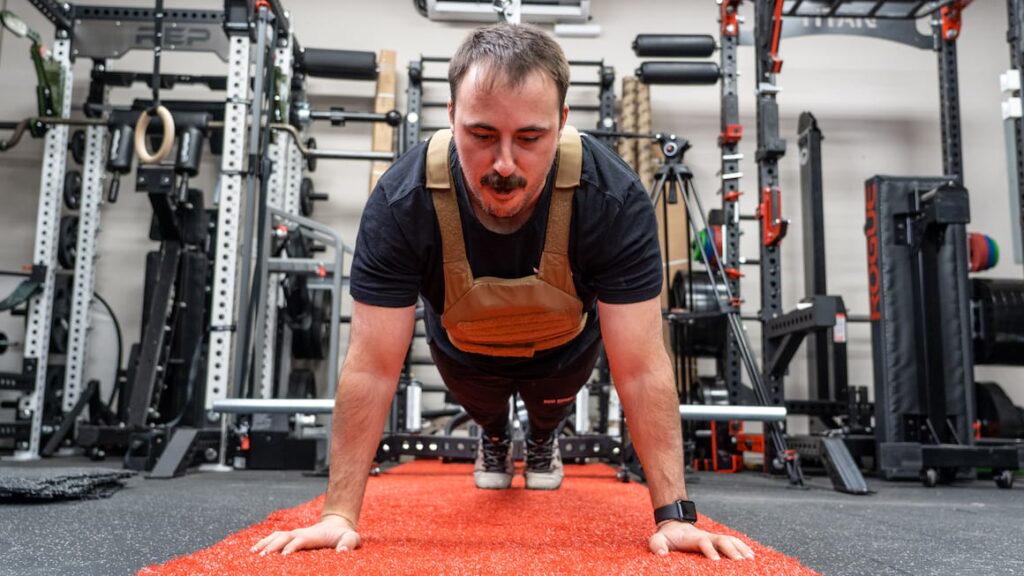
The exam and exam prep materials help coaches discern how to program for folks who work as emergency personnel and need tactical training (versus sport-specific training). The exam covers exercise technique, program design, wellness intervention, and general nutrition.
Additionally, it’s worth noting that taking this exam can count as CEU credit for anyone who holds a current NSCA certification.
RELATED: Kabuki Strength Tactical ShouldeRok Review
| Textbooks | Essentials of Tactical Strength and Conditioning |
| Textbook prices | $95 (99 for non-members) |
| Exam registration fee | $300 ($435 for non-members) |
| Course and textbook bundle | $200 ($250 for non-members); Note: not a bundle, no textbook included |
| Practice test/quizzes prices | $150 ($200 for non-members) |
| Study guide prices | $20 ($27 for non-members) |
| Exam format | 150 multiple-choice questions; in-person proctored exam; 3 hour max |
Who Should Earn a NSCA Certification?
Because it can be difficult to choose the right certification for how you want to coach and who you want to train, I broke down each of the five NSCA certifications and what they are ideally used for in your training career.
- CSCS: Ideal for training athletes and team sports to improve athletic performance and speed.
- CPT: Prepares trainers to work with general population clients to work toward their fitness goals.
- CPSS: A certification deeply rooted in science and research usually geared toward leading research or analyzing performance for universities, sports organizations, and tactical training units.
- CSPS: Provides credentials for coaches to work with special populations including folks with cancer, cardiovascular or pulmonary disease, and musculoskeletal disorders to name a few.
- TSAC-F: Prepares trainers to coach military, fire and rescue, law enforcement, and other emergency personnel to improve performance and decrease risk of injury in the field.
Buying Guide: What to Expect In a NSCA Certification
When it comes to any of the five NSCA certification options, there are similarities when it comes to costs, prerequisites, course materials, and more. I’m going to outline the basics below to give you an overview of what you can expect, but there is also a ton of information in the NSCA certification handbook.
Cost
For better or worse, the NSCA doesn’t offer package deals. You’ll buy study guides, textbooks, practice tests, and final exams all separately. The exam alone ranges from $300 to $475 depending on which exam and if you’re an active NSCA member (which is $130 annually and gets you discounts on the exams and slight price breaks on study materials).
Unlike many other accredited personal training programs, the only bundle deal you’ll find is an exam prep online course and textbook combo for the NSCA-CPT and the CSCS. None of the other certifications offer this combination deal. The CSPS and the CPSS only have textbooks and limited exam prep materials available.
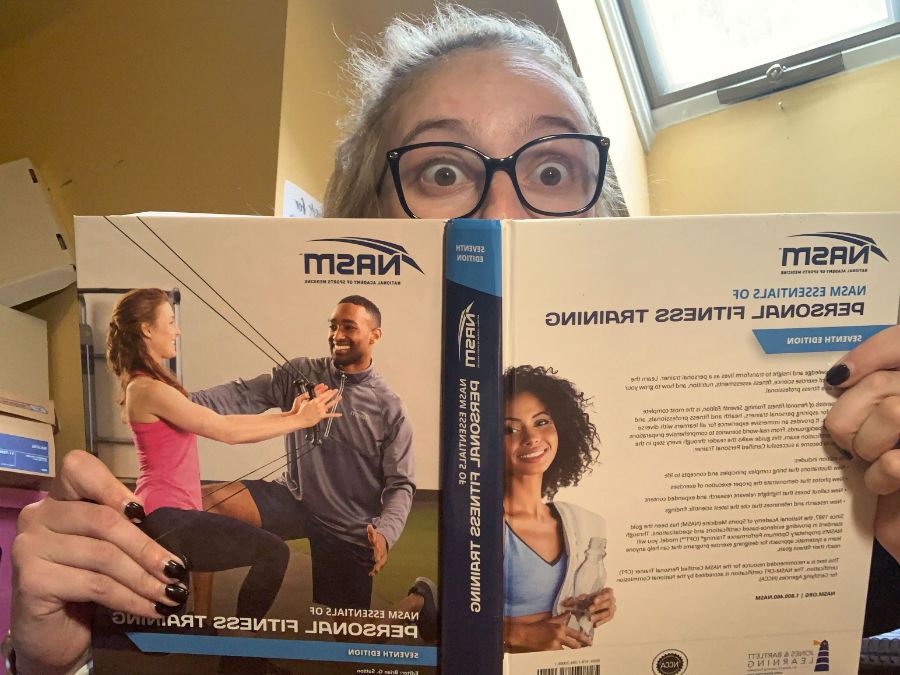
With the NSCA’s a la carte structure, you can purchase the textbook and study guide (or detailed content outline, depending on which certification you choose) to get started and buy the practice test and quizzes when you’re working through some material and you’re closer to taking the final exam.
When you’re ready for the exam, you’ll purchase that separately, too. Once you register for the exam (or apply in some cases) you’ll have a 120-day window to schedule your test with Pearson VUE, which is a proctored exam center. You’ll be able to locate a testing center near the Pearson VUE website or contact them directly if you can’t find something locally.
Here is a general overview of what to expect. Costs vary depending on certification type:
- Textbooks: $80 to $119
- Study guide: $20 to $27
- Practice test and quizzes: $50 to $200
- Online study courses (or bundles): $200 to $269
- Exams: $300 to $475
- NSCA membership: $130 ($65 for students)
Prerequisites
Each NSCA certification has its own unique requirements, but across the board you will need your CPR/AED certification (with the exception of the CPSS). If you’re not certified at the time of your exam, you’ll have a one-year window after the date of your passed exam to show you successfully completed the CPR and AED course through an acceptable organization.
In addition to being CPR/AED certified, the NSCA-CPT and the TASC-F certification require exam candidates to be 18 years of age or older and have a high school diploma or equivalent. These are both designed to be entry-level certification programs that allow folks without hands-on experience and formal education in exercise science to become a fitness professional.
The other three certifications through the NSCA are advanced courses that require either a bachelor’s degree (or higher) or, in some cases, proof of applicable hands-on experience and an accredited personal trainer certification.
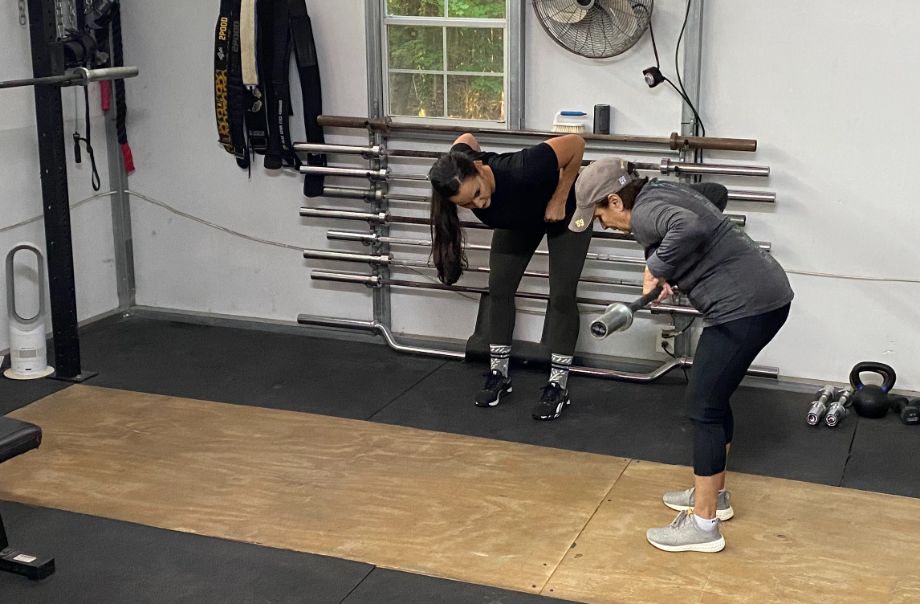
It’s also worth mentioning again that the NSCA plans to change the prerequisites for CSCS exam eligibility. Starting on January 1, 2030 the CSCS exam will require candidates to have a Bachelor’s of Science in a field closely related to strength and conditioning.
Here’s a quick breakdown of each exam’s prerequisites:
- CSCS: Bachelor’s degree (will eventually require a BS in exercise science or related)
- CPT: High school diploma (or equivalent), 18 years of age
- CPSS: 250 hours of special population coaching and either a current NSCA or CPT certification, related bachelor’s degree, or current license as a physical therapist, chiropractor, athletic trainer, or dietitian
- CSPS: Bachelor of Science in exercise science, sport science, kinesiology or related
- TSAC-F: High school diploma (or equivalent), 18 years of age
Course Material
Each test covers different topics and materials, specific to the intent of coaching. Below I outline the textbooks that each final exam is based on.
- CSCS: Essentials of Strength Training And Conditioning; Exercise Technique Manual
- CPT: Essentials of Personal Training; Exercise Technique Manual
- CPSS: Essentials of Sport Science
- CSPS: Essentials of Training Special Populations
- TSAC-F: Essentials of Tactical Strength and Conditioning
It’s also worth noting that all but one exam (CSPS) offers a free detailed content outline. I collected them here for your reference:
In addition to the textbooks for each certification, here is what types of study materials you can find available for each exam:
| Study course bundle | Study guide | Detailed content outline | Practice test | |
| CSCS | Yes | Yes | Yes | Yes |
| CPT | Yes | Yes | Yes | Yes |
| CPSS | No | No | Yes | No |
| CSPS | No | Yes | No | Yes |
| TSAC-F | No textbook | Yes | Yes | Yes |
Exam Format
All NSCA exams follow a multiple-choice question format with a maximum amount of time you can sit for the exam. The CSCS and the CPSS are the only two exams that are broken down into two distinct sections with a break in between.
Once you register, all exams have a 120-day window to be scheduled through Pearson VUE exam centers. Locating an exam center is easy through the Pearson VUE website and you’ll be able to contact the company if you have trouble finding a testing center.
Here is what you can expect with each exam:
- CSCS: 215 multiple-choice questions; 4 hour max, broken into two sections
- CPT: 155 multiple choice-questions; 3 hour max
- CPSS: 115 multiple-choice questions; 2 hour 45 minute max, broken into two sections
- CSPS: 110 multiple-choice questions; 2.5 hour max
- TSAC-F: 150 multiple-choice questions; in-person proctored exam or online proctored; 3 hour max
Pass Rate
In general, the NSCA has a tough exam process. The exam questions can be rather complex and nuanced. According to the NSCA, the 2022 exam rates were as follows:
- CSCS: 38% for passing both sections
- CPT: 66% for first-time candidates
- CPSS: 65% of first-time candidates
- CSPS: 59% of candidates passed
- TSAC-F: 85% of candidates passed
Accreditation
All five NSCA certifications are NCCA-accredited. That means your fitness industry credentials will be approved by the National Commission For Certifying Agencies, which is an agency that sets the standard for many professional certification programs.
Recertification Requirements
The NSCA has a two-year reporting period to maintain your certification. In the two-year period you’ll need to earn 6.0 CEU credits from at least two of the four following categories:
- Category A: Attend an event
- Category B: Share your experience
- Category C: Advance your education
- Category D: Pass an NSCA quiz/assessment
You can either engage in the above categories for continuing education (or, in some cases you can or retake the exam). For most of the certifications through the NCSA, you’ll need to maintain your CPR/AED certification for recertification, too.
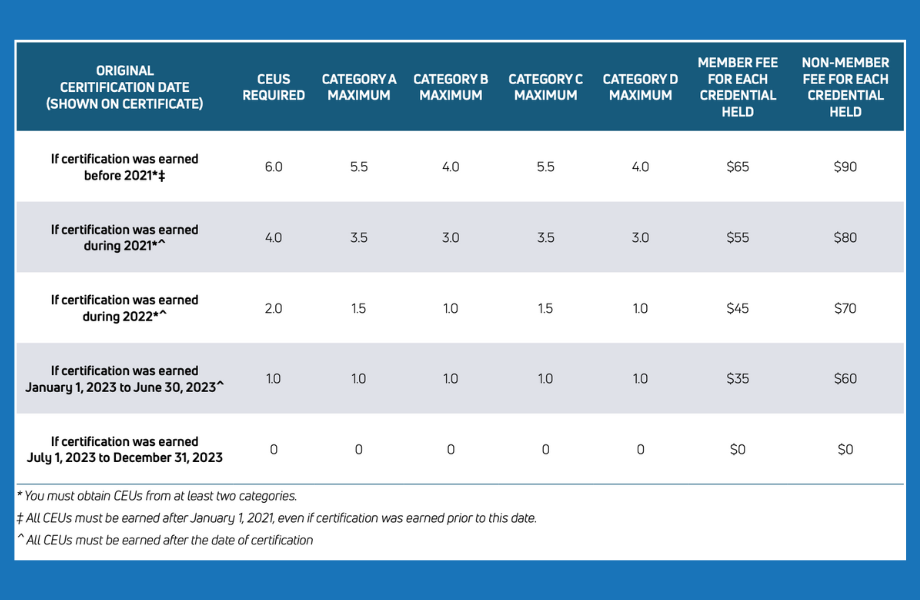
NSCA Certifications: FAQs
What is a NSCA certification?
There are five NSCA certifications, all of which place a special emphasis on certain populations or types of training within the general parameters of strength and conditioning. The five NSCA certifications include:
–Certified Strength and Conditioning Specialist: NSCA CSCS
–Certified Personal Trainer: NSCA-CPT
–Certified Performance And Sport Scientist: NSCA CPSS
–Certified Special Population Specialist: NSCA CSPS
–Tactical Strength And Conditioning Facilitator: NSCA TSAC-F
Does the NSCA cost money?
Yes, all NSCA certifications will run you several hundred dollars. Additionally, if you pay for an annual membership (valued at $130), you can receive slight discounts on exams and exam materials. Each certification is different, but here is an overview of what you can expect to pay per item:
–Textbooks: $80 to $119
–Study guide: $20 to $27
–Practice test and quizzes: $50 to $200
–Online study courses (or bundles): $200 to $269
–Exams: $300 to $475
–NSCA membership: $130 ($65 for students)
Is NASM or NSCA better?
When it comes to earning a CPT, a common debate is NASM vs. NSCA. Lucky for you, we have a side-by-side NASM vs NSCA comparison that outlines the pros and cons of each.
Further reading

Ready to elevate your protein intake and muscle growth with ease? Our team of nutrition and testing experts unwraps the best protein bars for muscle gain. Read more

A little bit of tech and solid functionality is what you’ll get, as evidenced by our NordicTrack T7 Si treadmill review. Read more

In this XTERRA TRX4500 treadmill review, we’ll introduce the machine that was built with runners, featuring a spacious running deck and powerful motor. Read more

Our fitness experts take you through our seven top picks for the best under-desk treadmills for home or office to help stay active during your next work day. Read more

